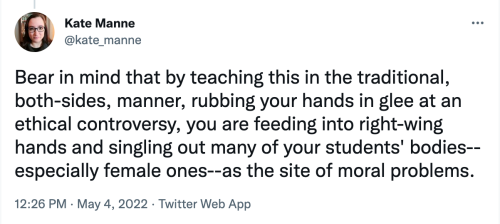#kate manne
If the cultivation of the understanding consists in one thing more than in another, it is surely in learning the grounds of one’s own opinions. Whatever people believe, on subjects on which it is of the first importance to believe rightly, they ought to be able to defend against at least the common objections. But, some one may say, “Let them be taught the grounds of their opinions. It does not follow that opinions must be merely parroted because they are never heard controverted. Persons who learn geometry do not simply commit the theorems to memory, but understand and learn likewise the demonstrations; and it would be absurd to say that they remain ignorant of the grounds of geometrical truths, because they never hear any one deny, and attempt to disprove them.” Undoubtedly: and such teaching suffices on a subject like mathematics, where there is nothing at all to be said on the wrong side of the question. The peculiarity of the evidence of mathematical truths is, that all the argument is on one side. There are no objections, and no answers to objections. But on every subject on which difference of opinion is possible, the truth depends on a balance to be struck between two sets of conflicting reasons. Even in natural philosophy, there is always some other explanation possible of the same facts; some geocentric theory instead of heliocentric, some phlogiston instead of oxygen; and it has to be shown why that other theory cannot be the true one: and until this is shown, and until we know how it is shown, we do not understand the grounds of our opinion. But when we turn to subjects infinitely more complicated, to morals, religion, politics, social relations, and the business of life, three-fourths of the arguments for every disputed opinion consist in dispelling the appearances which favour some opinion different from it. The greatest orator, save one, of antiquity, has left it on record that he always studied his adversary’s case with as great, if not with still greater, intensity than even his own. What Cicero practised as the means of forensic success, requires to be imitated by all who study any subject in order to arrive at the truth. He who knows only his own side of the case, knows little of that. His reasons may be good, and no one may have been able to refute them. But if he is equally unable to refute the reasons on the opposite side; if he does not so much as know what they are, he has no ground for preferring either opinion. The rational position for him would be suspension of judgment, and unless he contents himself with that, he is either led by authority, or adopts, like the generality of the world, the side to which he feels most inclination. Nor is it enough that he should hear the arguments of adversaries from his own teachers, presented as they state them, and accompanied by what they offer as refutations. That is not the way to do justice to the arguments, or bring them into real contact with his own mind. He must be able to hear them from persons who actually believe them; who defend them in earnest, and do their very utmost for them. He must know them in their most plausible and persuasive form; he must feel the whole force of the difficulty which the true view of the subject has to encounter and dispose of; else he will never really possess himself of the portion of truth which meets and removes that difficulty. Ninety-nine in a hundred of what are called educated men are in this condition; even of those who can argue fluently for their opinions. Their conclusion may be true, but it might be false for anything they know: they have never thrown themselves into the mental position of those who think differently from them, and considered what such persons may have to say; and consequently they do not, in any proper sense of the word, know the doctrine which they themselves profess.
—John Stuart Mill, On Liberty(1859)
My “female-bodied” Catholic school teachers, lay and religious, most of them daughters of the immigrant working class, who marched on Washington every January 22 and had us write our congressional representatives once or twice a year protesting abortion, send their regards. They certainly thought it was an ethical question—and, since these are not mutually exclusive categories, a political one too, hence their petitioning the state. I am in the end as much the student of John Stuart Mill as of them, civil libertarian in inclination and by conviction, so my politics are not theirs; but I will not do them the injustice of denying them a coherent ethics. They believed they were defending souls. And there was and remains something sublime in this belief, even for those of us who don’t share it. Just because you will not deign to understand their ethics, it only shows that you, for all your honors and your erudition, have been easily outsmarted by a group of elementary school teachers to whom, in the guise of championing the female and otherwise marginalized intellect, you baselessly condescend.
Post link
“Think of misogyny, then, as the law enforcement branch of a patriarchal order. This makes for a useful if rough contrast between misogyny and sexism. Whereas misogyny upholds the social norms of patriarchies by patrolling and policing them, sexism serves to justify these norms, largely via an ideology of supposedly natural differences between men and women with respect to their talents, interests, proclivities, and appetites.
Sexism is bookish; misogyny is combative. Sexism is complacent; misogyny is anxious. Sexism has a theory; misogyny wields a cudgel.” Read the full forum.
Post link
Down Girl: The Logic of Misogyny (Kate Manne, 2017)
“But as I have shown, it is not that Rodger held women to be mindless things, objects, nonhuman or subhuman creatures; nor is this true of women in general under a patriarchal order.
Rather, a woman is regarded as owing her human capacities to particular people, often men or his children within heterosexual relationships that also uphold white supremacy, and who are in turn deemed entitled to her services.
This might be envisaged as the de facto legacy of coverture law—a woman’s being “spoken for” by her father, and afterward her husband, then son-in-law, and so on.
And it is plausibly part of what makes women more broadly somebody’s mother, sister, daughter, grandmother: always somebody’s someone, and seldom her own person.
But this is not because she’s not held to be a person at all, but rather because her personhood is held to be owed to others, in the form of service labor, love, and loyalty.
Her personal services, moreover, have a humanizing psychological effect on those in her care orbit, to whom her attention is held to be owed.
So, when she fails to give him what he’s held to be entitled to, by way of various forms of nurturing, admiration, sympathy, and attention, he may be left feeling less than human—like “an insignificant little mouse,” as Elliot Rodger described himself at one point.
And his revenge may be to dehumanize her in turn: to give her a taste of her own medicine, when it comes to making her feel like a nonperson. (…)
Listening and offering sympathy to those who are prone to shame-based misogynistic as well as racist outbursts is feeding the very need and sense of entitlement that drives them in the first place, when they go unmet.
In other words, it’s adding fuel to the fire, at least in the long term.
You can’t do much to help or give to someone who, yes, is in genuine pain and lashing out— but only because they feel too needy and illicitly entitled to getting such moral attentions to begin with.”


